13 Natural Home Remedies For Hair Growth And Thickness
Because the secret to thick, healthy hair could reside within your own home.

Image: Midjourney/ StyleCraze Design Team
Looking for natural home remedies for hair growth and thickness? We can tell you all about it so you can identify the best ingredients to enhance your hair. Hair loss and thinning are typical problems today. A decrease in hair quality, hair damage, and hair fall is caused by modern lifestyles, pollution, and the overuse of chemicals in regular hair care products. Given the state of affairs, an increasing number of women are turning to natural remedies while looking for ways to enhance hair growth. These remedies not only provide safer alternatives to chemical treatments but are also cost-effective as they typically comprise readily available kitchen ingredients.
Ready to harness the power of nature to nourish and rejuvenate your hair? We shall take you through some of the most effective home remedies backed by scientific research to strengthen hair and promote natural growth. Keep reading to learn more.
In This Article
Top Remedies For Hair Growth You Can Try At Home
Natural ingredients like ginseng, coconut oil, and essential oils offer unique benefits that can contribute to stronger hair, improved hair count, and overall hair health. These natural remedies work by targeting specific pathways that support hair growth, making them a gentle and effective alternative to commercial products. Scroll down to understand the unique benefits they offer and ways to use them.
1. Coconut Oil
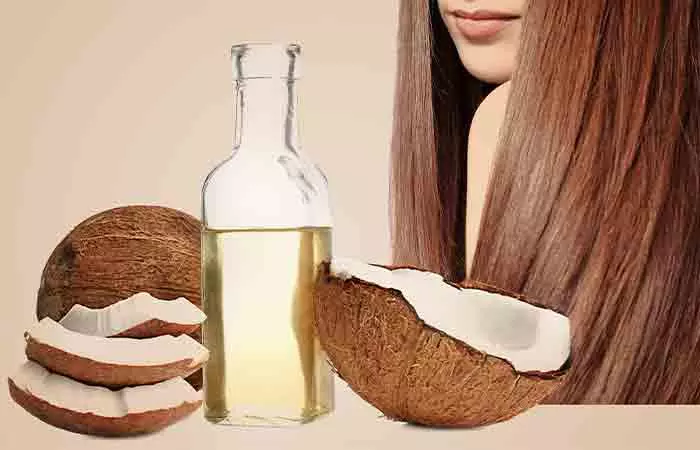
Coconut oil has the ability to reduce the loss of protein from damaged hair (1). Coconut Oil can penetrate the hair shaft, providing a boost of nourishment, and reducing hair loss. This property of coconut oil may help reverse the effect of harsh chemical products. Additionally, massaging coconut oil onto your scalp can improve blood circulation, which promotes healthier hair follicles and supports overall natural hair growth. You can also use coconut milk for an enhanced effect.
What You Can Do: Take 2 tablespoons of coconut oil in your palm and give a good scalp massage. You can leave it on for about an hour and then wash it off thoroughly using a mild cleanser or regular shampoo. Do this at least twice a week.
2. Gooseberry
Amla or gooseberry is considered to be a great natural remedy for hair growth. It is a commonly used ingredient in Ayurvedic medicine. It has been found to have a proliferative effecti The process where cells divide and increase in number by multiplying and producing new tissue that helps in their growth. on the human dermal papilla cells (DPC) of the hair follicles. Thus, gooseberries might promote hair growth by extending the anagen phase (active growth phase) of the hair growth cycle (2).
What You Can Do: Take some amla oil in your palms and massage it into your scalp. You can leave it on for an hour (or more) and then rinse it off thoroughly. Do this twice a week for better scalp condition. This natural hair loss remedy can help improve the condition of your scalp and promote natural hair growth when done twice a week.
3. Yogurt

Yogurt is a rich source of probiotics and may facilitate robust hair growth and prevent damage to hair. A study done on mice found that it increases the number of subcuticular follicles, thus yielding more luxuriant fur (3). Therefore, this home remedy may also help boost natural hair growth in humans.
What You Can Do: Have a serving of yogurt once daily.
4. Fenugreek
Fenugreek contains active compounds that may promote the growth of healthy hair. An animal study found that fenugreek could significantly reduce hair loss and promote new hair growth (4). Topical application of this remedy may help reduce scalp issues. It is also one of the best herbal remedies for clearing dandruff from the scalp
A study tested the effectiveness of fenugreek seed paste in treating dandruff among 9 adolescent girls. Dandruff levels were measured six times before and after applying the paste, showing a significant decrease from a mean score of 1.88 to 1.33. The study concluded that fenugreek seed paste is a cost-effective, natural remedy for dandruff (5).
Certain herbs for hair growth can be added to home remedies to help you achieve thicker, healthier hair without harsh chemicals.
However, do not follow this natural home remedy if you are allergic to legumes such as peanuts, green peas, or soybeans. You may be allergic to fenugreek seeds as well as they all belong to the Fabaceae family.
What You Can Do: Soak a quarter cup of fenugreek seeds in lukewarm water overnight. Grind the seeds into a paste and apply it as a hair mask. Leave it on for 30-45 minutes before rinsing it off with plain lukewarm water. This natural hair loss treatment can be followed once a week to potentially promote hair growth and improve hair health.
5. Onion Juice
Researchers have discovered that the phytochemical compounds in onion juice can help induce hair regrowth and that it may be an efficient topical treatment for patchy alopecia areata. This study tested if onion juice works better than tap water for treating alopecia areata. There were two groups where 23 people used onion juice and 15 people used tap water, applying it twice a day for two months. In the onion juice group, 17 people (73.9%) had hair regrowth after four weeks, and 20 people (86.9%) saw regrowth after six weeks, with men (93.7%) responding better than women (71.4%). In the tap water group, only 2 people (13%) had hair regrowth after eight weeks. The study found onion juice to be much more effective than tap water for hair regrowth (6).
What You Can Do: Extract the juice of half an onion. Strain it and apply it to your scalp. Leave it on for an hour. Wash it off thoroughly with a regular shampoo and warm water. Add this natural product into your hair care routine twice a week.
6. Chinese Hibiscus

Extracts of hibiscus leaves and flowers have been found to promote the growth of hair in rats (7). Thus, they may have the potential to reverse the effects of excessive hair fall in humans.
What You Can Do: Grind a couple of hibiscus flowers and a handful of leaves to make a paste. Mix it with coconut oil. or even consider adding a few drops of beneficial peppermint oil for added stimulation. Apply this natural remedy and leave it on for an hour. Wash it off with regular shampoo. Do this once a week.
7. Green Tea
Green tea is rich in polyphenolsi Organic compounds naturally found in plants, fruits, and vegetables that have antioxidant properties. and antioxidants that can help promote hair growth. It has been observed that the bioactive compounds in green tea can have a proliferative effect on the human dermal papilla cells (specialized cells in the hair follicles) and have the potential to reduce hair loss (8). Avoid drinking green tea if you have an intolerance for caffeine or are taking stimulantsi Substances that increase the activity of the central nervous system and excite the body, often used to boost alertness and energy. or blood thinners.
What You Can Do: Steep a green tea bag in a cup of boiling water and consume the decoction. You can drink green tea 1-2 times a day.
8. Rosemary Oil
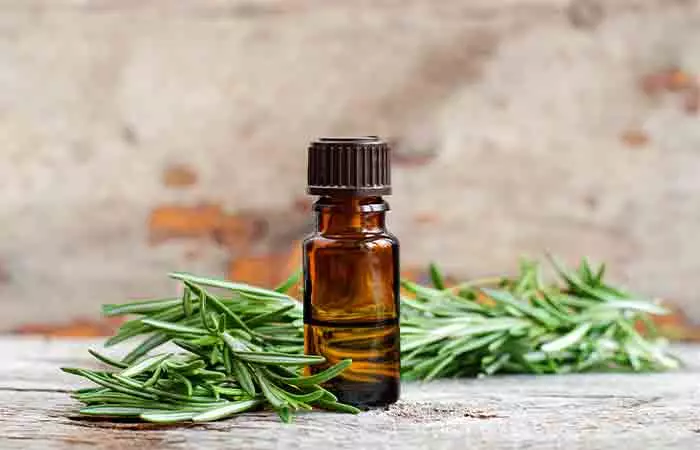
According to a study conducted on mice at Kinki University, rosemary oil may help increase hair growth (9). The topical application of this remedy for hair loss could make it suitable for enhancing hair growth in humans as well.
What You Can Do: Do a patch test to determine if you are allergic to rosemary oil. As essential oils are highly concentrated, mix a few drops of rosemary oil with a carrier oil. Apply this home remedy for hair growth on the scalp and let it sit for an hour before washing it off with a mild shampoo.
9. Geranium Oil
Geranium oil has been proven to promote hair growth in mice via a proliferative effect on dermal papilla cells (10). Therefore, it might also have a similar effect on human dermal papilla cells in the hair follicles. Some people may have an allergic reaction to geranium oil, so do a patch test before use.
What You Can Do: Take a few tablespoons of geranium oil and give a good scalp massage. Leave it on for about 60 minutes, then rinse it off with a mild shampoo. You can do this at least once a week.
10. Ginseng
Research shows that ginseng can have a proliferative effect on human hair follicles to promote hair growth (11). Some people may experience dizziness, nausea, or headaches upon using ginseng. It may also be a stimulant in some cases. Therefore, proceed with caution.
Before incorporating ginseng into your hair care routine, consult a healthcare professional and conduct a comprehensive review to ensure that the potential benefits of ginseng for hair regrowth outweigh any potential side effects.
What You Can Do: Take a few tablespoons of ginseng oil and gently massage it into your scalp. Leave it on for about an hour. Rinse it off with a mild shampoo. You can do this at least twice a week.
11. Fish Oil
Fish oil is rich in omega-3 fatty acids that can promote the growth of hair. Fish oil supplements contain docosahexaenoic acid (DHA) that induces the growth of hair by exhibiting a proliferative effect on the human dermal papilla cells in your scalp (12). This can reverse the impact of hair thinning and balding. Make sure you consult your dermatologist before taking fish oil supplements.
12. Coffee

Caffeine is a major component of coffee. Research shows that caffeine can promote the elongation of the hair shaft and stimulate hair growth by prolonging the anagen phase (13). This may help reduce balding and hair thinning.
What You Can Do: Brew a cup of coffee and have it at least once a day. Do not consume excess coffee due to its high caffeine content.
13. Garlic
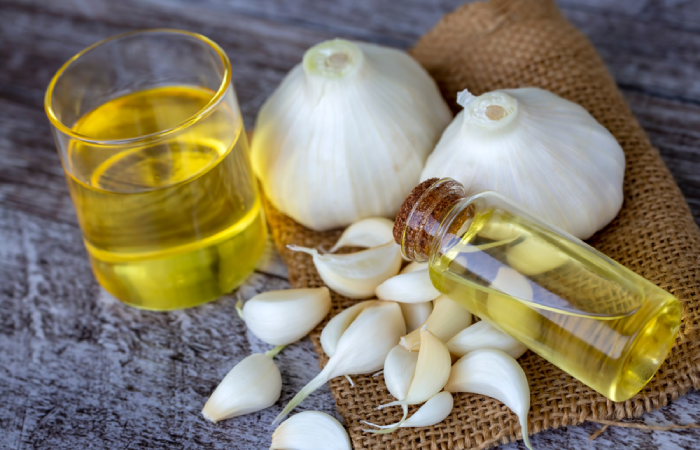
Garlic has been shown to promote hair growth in animal studies. The study tested garlic exosome (GE) on hair growth in animals and found that GE significantly increased hair follicles and follicle size compared to control groups. The 4 mg GE group had the largest follicles, and GE boosted proteins that promote hair growth. The study concluded that GE stimulates hair growth through specific growth pathways (14). It also possesses anti-inflammatory properties that may help fight scalp infections and promote scalp healing. Using garlic for hair growth could be a natural and cost-effective remedy for hair loss. Some believe it also may help increase hair count.
What You Can Do: Crush 2 to 3 garlic cloves and mix them with a carrier oil (coconut or olive oil). Massage into the scalp for an hour, at least twice a week. You may also use a garlic mask. Just blend crushed garlic cloves with a few tablespoons of yogurt or honey and apply to the hair and scalp for 30 minutes. Follow with a shampoo wash.
However, be mindful of garlic’s strong scent. Also, conduct a patch test for skin sensitivity.
Tanya Wilson, a blogger, wrote about home remedies for hair loss that she has been using for the past 18 years. She mentions various tips and methods to promote hair growth using ginseng, onion water, and aloe vera. She emphasizes that the approach to hair care should be holistic and consider both internal and external factors. She writes, “You can find many home remedies for hair growth, but for faster hair growth, a combination of the above methods will be the best (i).”
Start with simple tips to make hair grow faster, such as massaging the scalp. Also, consider using natural remedies as much as possible. Most of the ingredients are available easily. When buying ingredients for these natural remedies, look for quality products from trusted stores or online platforms. Here are some tips:
- For oils and extracts, check the labels to ensure they are pure and free from additives.
- For herbs like fenugreek or amla, choose from reputable brands that specialize in natural products.
However, while using home remedies for hair growth you also need to watch out for allergies or skin sensitivity. Always do a patch test before using any new product on your scalp. If irritation occurs, discontinue use. When using essential oils like rosemary or geranium, mix them with carrier oil such as coconut oil, olive oil, or jojoba oil to dilute their potency. A general guideline is to mix 3-5 drops of essential oil with one tablespoon of carrier oil. Be patient with natural remedies as results may take time to show.
As with any condition, a balanced diet goes a long way in ensuring that you are healthy and supplementing the right amount of nutrients to your body. Including nutrient-rich foods in your diet can provide your body with the tools it needs to boost healthy and vibrant hair growth. Here are a few foods that you must eat to ensure healthy hair growth, along with natural home remedies for hair growth.
Key Takeaways
- Massage coconut oil on your scalp to prevent hair loss as the oil penetrates the hair shaft.
- Massage gooseberry oil on the scalp around an hour before washing your hair with a mild shampoo to promote hair growth by increasing human dermal papilla cells.
- Use a hair mask made of fenugreek seeds and Chinese hibiscus to promote hair growth.
- Consume a diet rich in omega-3 fatty acids and vitamin C.
Diet That Promotes Hair Growth
It is important to ensure your diet is rich in key nutrients like vitamins A, B, C, D, and E, and minerals like iron, zinc, omega-3 fatty acids, etc., that are beneficial for hair growth. Here are some food options that are rich in these nutrients and can promote hair health.
- Consume fish rich in omega-3 fatty acids. A study conducted in France has found that supplementing your diet with omega-3 and 6 fatty acids can improve hair density and fight hair loss (17).
- Berries and other citrus fruits are rich in vitamin C. Studies suggest that foods rich in this vitamin may promote hair growth (18).
- Green leafy vegetables like spinach contain key nutrients like iron, zinc, and vitamins A and C that can aid hair growth (18).
- Nuts and seeds are packed with nutrients like omega-3 fatty acids, biotin, iron, and magnesium that can help control hair fall (18).
Medical Treatment Options
Here are a few medical treatment options you can consider to enhance hair growth:
- Minoxidil: This over-the-counter medication can be used by both men and women. You need to rub it into your scalp daily. However, it may cause an allergic reaction in some people (21).
- Finasteride: This is a medical treatment option, particularly for men. This pill is administered to men who have androgenic alopeciai Permanent hair loss from the body in both men and women caused due to a genetic predisposition to show an excessive response to androgens. . It may, however, have some side effects, such as erectile dysfunction, lowered sex drive, and gynecomastiai A condition that causes swelling of the male breast tissue due to an imbalance of the estrogen and testosterone hormones. (22).
How Can I Prevent Hair Fall?
- Following a strictly balanced diet with intake of foods rich in omega-3 fatty acids can help promote hair growth and prevent hair fall.
- Massage your scalp gently and regularly to stimulate blood circulation and support the nourishment of hair follicle cells, thereby strengthening hair roots and preventing hair fall.
- Staying hydrated is key to maintaining healthy hair. It nourishes the scalp and prevents flaking and itchy scalp. You may also incorporate an apple cider vinegar rinse in your hair care regime to maintain a healthy scalp. It contains acetic acid, which helps balance the scalp’s pH levels and promotes a conducive environment for hair growth.
- Use hair masks once or twice a week for deep conditioning your hair. You may use ingredients such as avocado, aloe vera gel, pumpkin seed oil, peppermint oil, olive oil, sunflower oil, or carrier oil like jojoba oil in your recipes for healthy hair. An egg mask can also prove to be beneficial.
Hair loss is an increasingly common problem that women all over the world face. There are several reasons for hair loss and factors that might affect women’s hair health and volume. Scroll down to take a look at the variety of factors for hair thinning.
Factors That Affect Hair Growth
- As we grow older, the diameter of the hair and its thickness can decrease (23). This can make it seem like you have had a lot of hair fall over time.
- Another factor that can affect hair growth is prevailing ailment or illness that can lead to hair fall. Hormonal imbalance or changes can also lead to hair fall in some men, subsequently causing male-pattern baldness (24). In women, hormonal shifts, such as those experienced during pregnancy or menopause, may lead to female pattern hair loss.
Other factors, such as stress, trauma, and anxiety, may also contribute to hair loss as studies show that they can have an inhibitory effect on hair growth (25). Managing your stress level and practicing relaxation techniques can play a significant role in maintaining healthy hair and preventing excessive hair fall. Additionally, avoid tight hairstyles that pull on the hair shafts and scalp to minimize hair breakage and damage. By taking proactive measures and adopting hair-friendly practices, you can positively impact the growth phase of your hair and promote overall hair health.
Infographic: 12 Natural Ingredients That Promote Hair Growth
You don’t need to invest in chemical formulations to achieve healthy hair growth. In fact, you need not look beyond your backyard garden or your pantry. There are various natural ingredients, with different hair care properties, that stimulate hair growth right in your kitchen.
Check out the infographic below for a quick rundown of 12 highly beneficial natural ingredients that can help you grow a proud mane of hair. Illustration: StyleCraze Design Team

Home remedies for hair growth work effectively, reducing hair damage and hair loss. Using coconut oil, gooseberry, onion juice, fenugreek, yogurt, a few drops of rosemary oil, Chinese hibiscus, green tea, aloe vera, and geranium oil as hair masks in your hair care regimen promotes the health of the hair follicle cells and encourages hair growth. Coffee, ginseng, and fish oil are also proven effective home remedies for hair growth. In addition to these, including protein-rich foods and vitamin E sources such as fish, berries, green leafy vegetables, nuts, and seeds in the diet promotes hair growth. Engaging in a simple activity like massaging your scalp and adequate hydration may have a beneficial effect on hair density and growth.
Frequently Asked Questions
How can I regrow my thinning hair?
You can explore medical and natural treatment options as both help promote healthy hair growth. Along with these options, you could also try the hair masks and remedies for hair growth mentioned above to provide your hair with the nourishment it needs to thrive.
How do you grow dead hair follicles?
You can consume vitamin supplements like biotin and niacin to revive dead hair follicles and restore strength to damaged and dry hair. These supplements, particularly biotin and vitamin B play a crucial role in promoting hair health and growth. Additionally, you should also massage your scalp regularly.
Can your hair grow back while on chemotherapy?
Yes, your hair can grow back while on chemotherapy, but it may be of a different color and texture.
How does yoga help stimulate hair growth?
Yoga can help in dealing with hair fall. Some of the asanas you can practice are downward dog pose (Adho Mukha Svanasana), diamond pose (Vajrasana), camel pose (Ustrasana), headstand pose (Sirsana), etc. These asanas increase blood flow to the head and stimulate circulation in the scalp. This, in turn, can aid hair growth.
Can bleached hair grow long?
Products that bleach your hair can lead to hair damage and slow down the growth of hair.
Is hot oil treatment good for hair growth?
Yes, massaging using hot oil can increase the flow of blood to your scalp. It can also repair damaged and dry hair. Hot oil treatment is a popular method for enhancing hair health and promoting hair growth. It can help improve the overall health of your hair and scalp, making your hair look shinier, smoother, and more manageable.
Do split ends stop hair growth?
Split ends do not stop the growth of your hair, but they can lead to increased hair breakage. This can make you feel like your hair is not growing in length.
Can rice water grow hair?
Yes. Studies suggest that a compound of rice water and hibiscus can boost hair growth and give fuller, stronger, and lustrous hair (22).
Is it true that castor oil helps regrow hair?
Yes, castor oil contains vitamin E and fatty acids that may help boost hair growth (23).
Does a hair spa help in hair growth?
Yes, a hair spa uses nourishing hair oil that hydrates your hair and makes it healthy. The spa also includes a scalp massage that improves your blood circulation. This, in turn, boosts hair growth.
Illustration: Natural Home Remedies For Hair Growth And Thickness
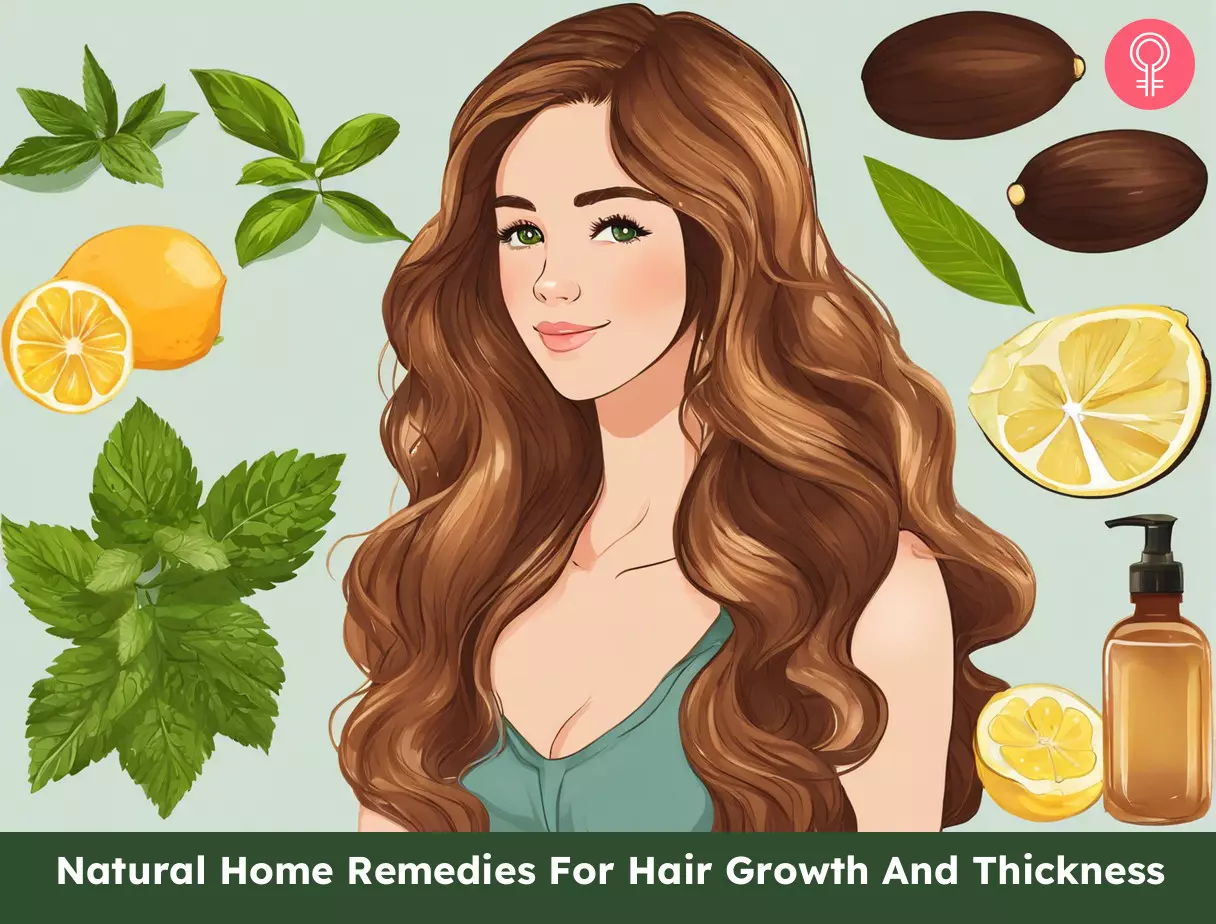
Image: Stable Diffusion/StyleCraze Design Team
Personal Experience: Source
StyleCraze's articles are interwoven with authentic personal narratives that provide depth and resonance to our content. Below are the sources of the personal accounts referenced in this article.
i. Game-changing home remedies for hair growth that actually work https://medium.com/@tanya.wil/game-changing-home-remedies-for-hair-growth-that-actually-work-21e05045315cReferences
Articles on StyleCraze are backed by verified information from peer-reviewed and academic research papers, reputed organizations, research institutions, and medical associations to ensure accuracy and relevance. Read our editorial policy to learn more.
- Effect of mineral oil, sunflower oil, and coconut oil on prevention of hair damage
https://pubmed.ncbi.nlm.nih.gov/12715094/ - Emblica (Phyllanthus Emblica Linn.) fruit extract promotes proliferation in dermal papilla cells of human hair follicle
https://www.researchgate.net/publication/270950892_Emblica_Phyllanthus_emblica_Linn_Fruit_Extract_Promotes_Proliferation_in_Dermal_Papilla_Cells_of_Human_Hair_Follicle - Probiotic bacteria induce a ‘glow of health’
https://pmc.ncbi.nlm.nih.gov/articles/PMC3547054/ - In vivo hair growth activity of herbal formulations
https://www.researchgate.net/publication/42597730_In_vivo_Hair_Growth_Activity_of_Herbal_Formulations - Effectiveness of fenugreek seed paste on dandruff among adolescent girls in selected women’s hostel, Coimbatore
https://ijneronline.com/HTMLPaper.aspx?Journal=International+Journal+of+Nursing+Education+and+Research%3BPID%3D2014-2-2-13 - Onion juice (Allium cepa L.), a new topical treatment for alopecia areata
https://pubmed.ncbi.nlm.nih.gov/12126069/ - In vivo and in vitro evaluation of hair growth potential of Hibiscus rosa-sinensis Linn.
https://www.sciencedirect.com/science/article/abs/pii/S0378874103002319 - Human hair growth enhancement in vitro by green tea epigallocatechin-3-gallate (EGCG)
https://pubmed.ncbi.nlm.nih.gov/17092697/ - Promotion of hair growth by Rosmarinus officinalis leaf extract
https://pubmed.ncbi.nlm.nih.gov/22517595/ - Hair growth-promoting effect of Geranium sibiricum extract in human dermal papilla cells and C57BL/6 mice
https://pmc.ncbi.nlm.nih.gov/articles/PMC5307826/ - Red ginseng extract promotes the hair growth in cultured human hair follicles
https://pmc.ncbi.nlm.nih.gov/articles/PMC4350143/ - Mackerel-derived fermented fish oil promotes hair growth by anagen-stimulating pathways
https://pmc.ncbi.nlm.nih.gov/articles/PMC6164340/ - Differential effects of caffeine on hair shaft elongation, matrix and outer root sheath keratinocyte proliferation, and transforming growth factor-β2/insulin-like growth factor-1-mediated regulation of the hair cycle in male and female human hair follicles in vitro
https://pubmed.ncbi.nlm.nih.gov/24836650/ - Garlic exosomes promote hair growth through the wnt/β-catenin pathway and growth factors
https://pmc.ncbi.nlm.nih.gov/articles/PMC10438139/ - The cardiovascular effects of flaxseed and its omega-3 fatty acid alpha-linolenic acid
https://pmc.ncbi.nlm.nih.gov/articles/PMC2989356/ - Fatty Acid supplements improve hair coat condition in rhesus macaques
https://pmc.ncbi.nlm.nih.gov/articles/PMC5597456/ - Effect of a nutritional supplement on hair loss in women
https://pubmed.ncbi.nlm.nih.gov/25573272/ - Nutrition of women with hair loss problem during the period of menopause
https://pmc.ncbi.nlm.nih.gov/articles/PMC4828511/ - The impact of egg nutrient composition and its consumption on cholesterol homeostasis
https://pmc.ncbi.nlm.nih.gov/articles/PMC6126094/ - Naturally occurring hair growth peptide: water-soluble chicken egg yolk peptides stimulate hair growth through induction of vascular endothelial growth factor production
https://pubmed.ncbi.nlm.nih.gov/29583066/ - Minoxidil use in dermatology, side effects and recent patents
https://pubmed.ncbi.nlm.nih.gov/22409453/ - Use of rice water (Oryza sativa) & hibiscus (Hibiscus rosa-sinensis) for hair nutrition and hair growth
https://www.jetir.org/view?paper=JETIR2106426 - Physicochemical characterization and evaluation of castor oil (R. communis) for hair biocosmetics
https://www.sciencepublishinggroup.com/article/10.11648/j.ajac.20190704.11 - Sex hormones and hair loss in men from the general population of northeastern Germany
https://pmc.ncbi.nlm.nih.gov/articles/PMC5817427/ - Burden of hair loss: stress and the underestimated psychosocial impact of telogen effluvium and androgenetic alopecia
https://pubmed.ncbi.nlm.nih.gov/15304082/
Read full bio of Dr. Anjali Asok
Read full bio of Sucharita Mishra
Read full bio of Anjali Sayee
Read full bio of Swathi E






 Quick Tip
Quick Tip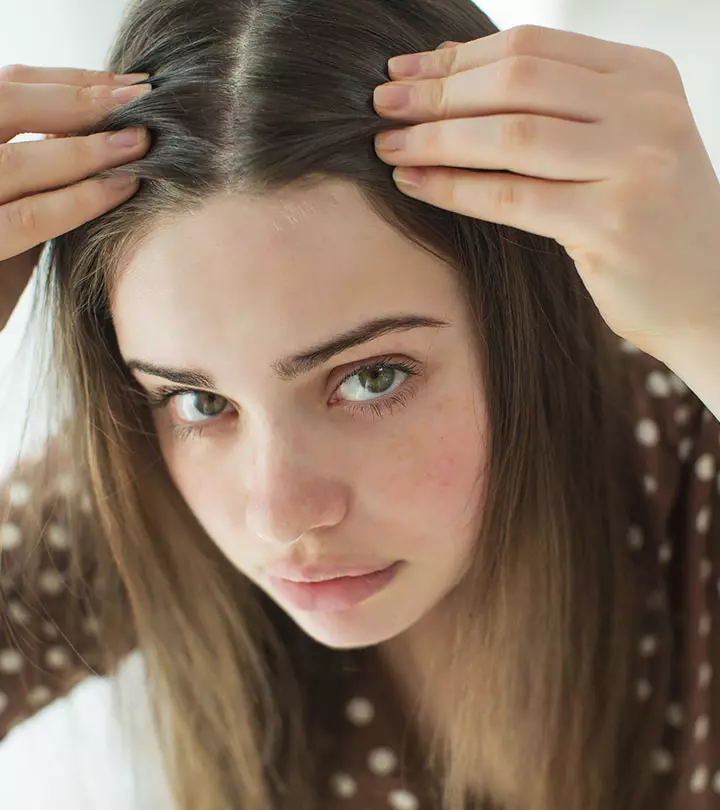
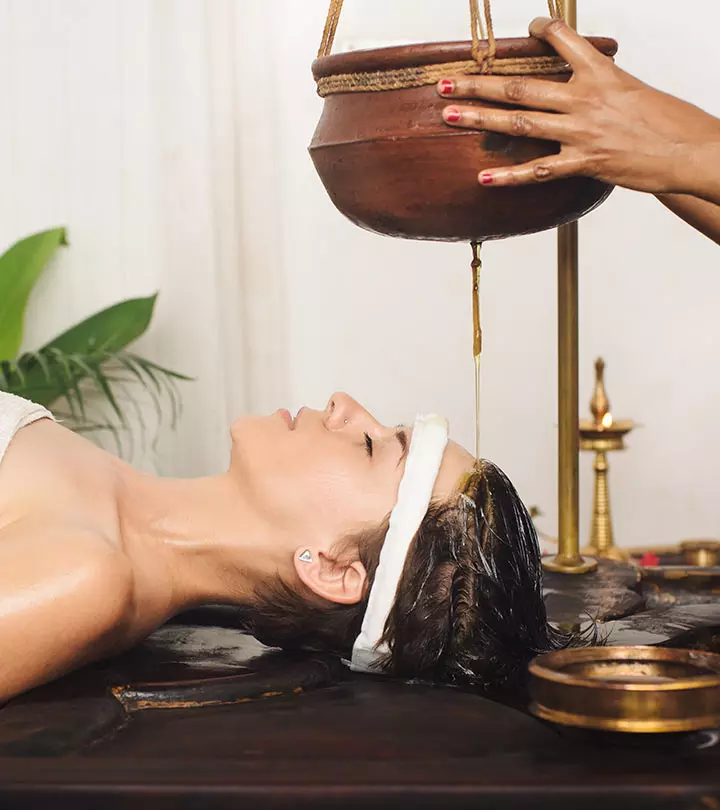
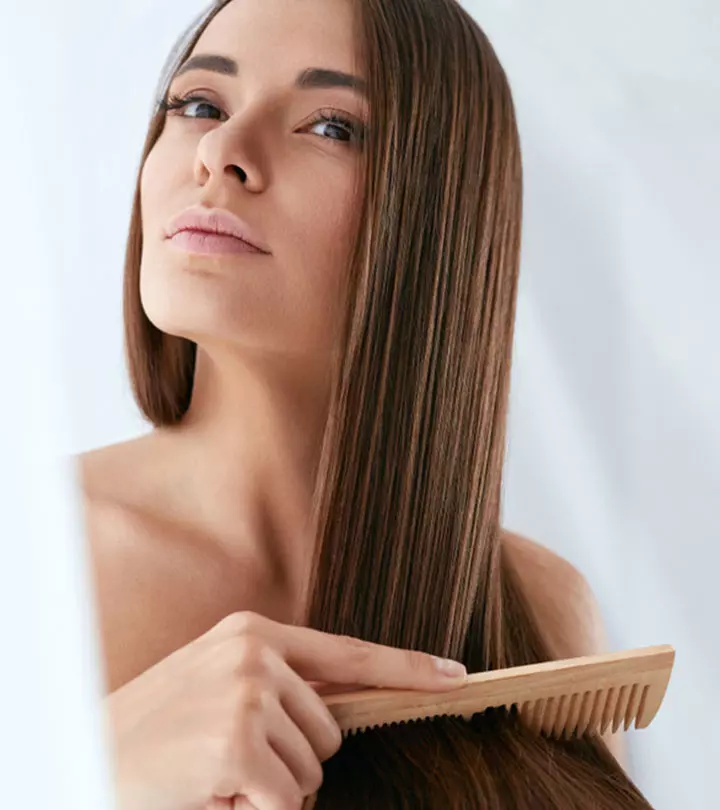

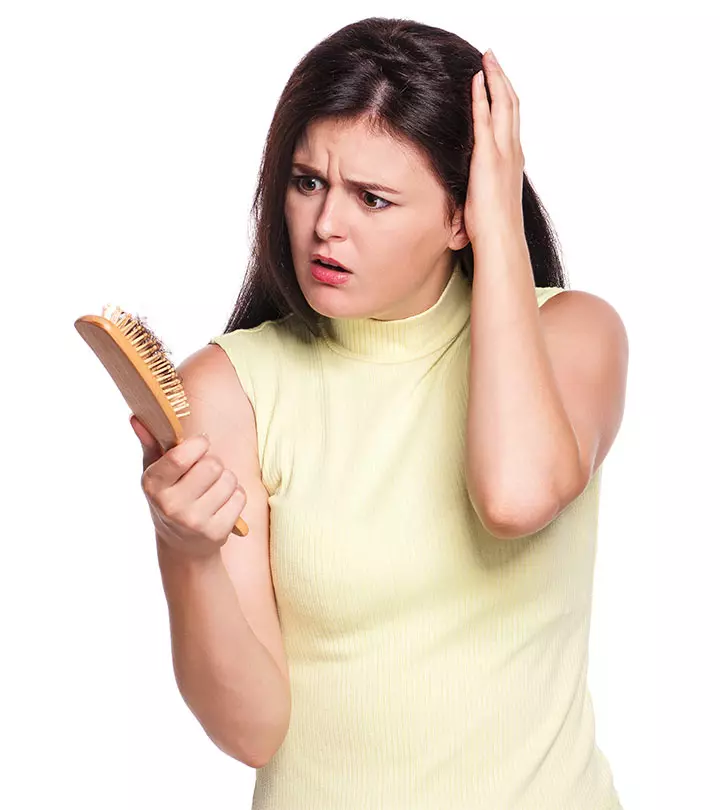




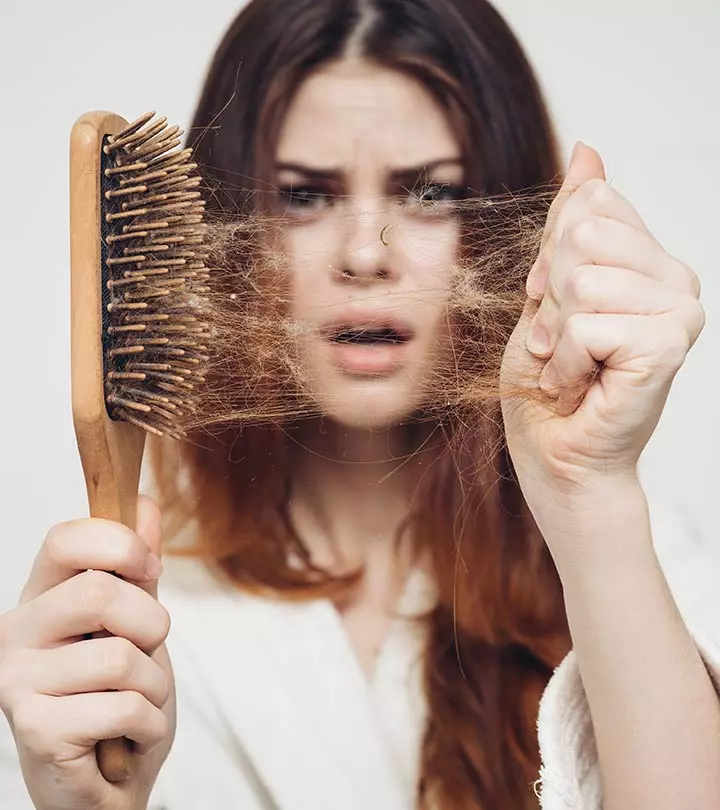
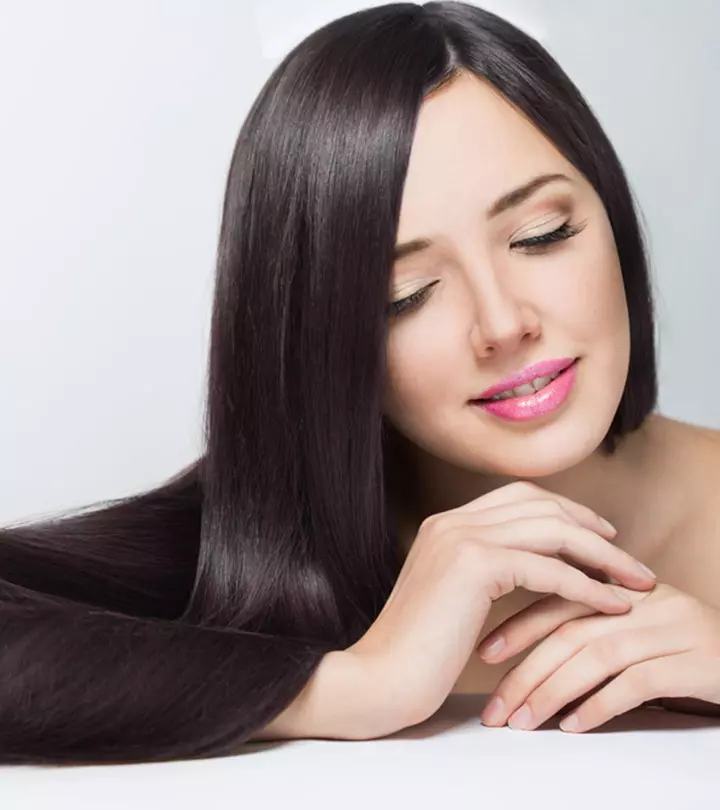

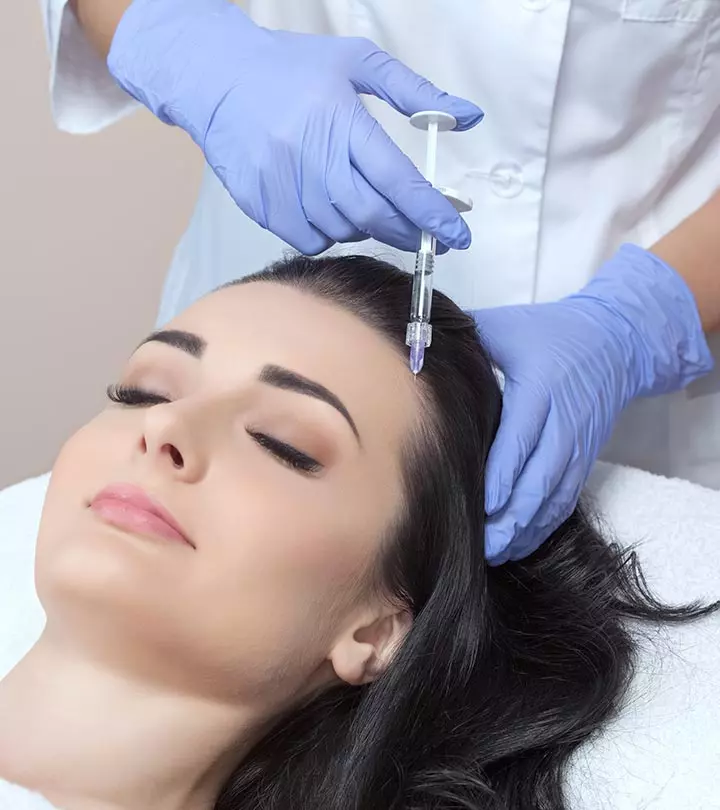
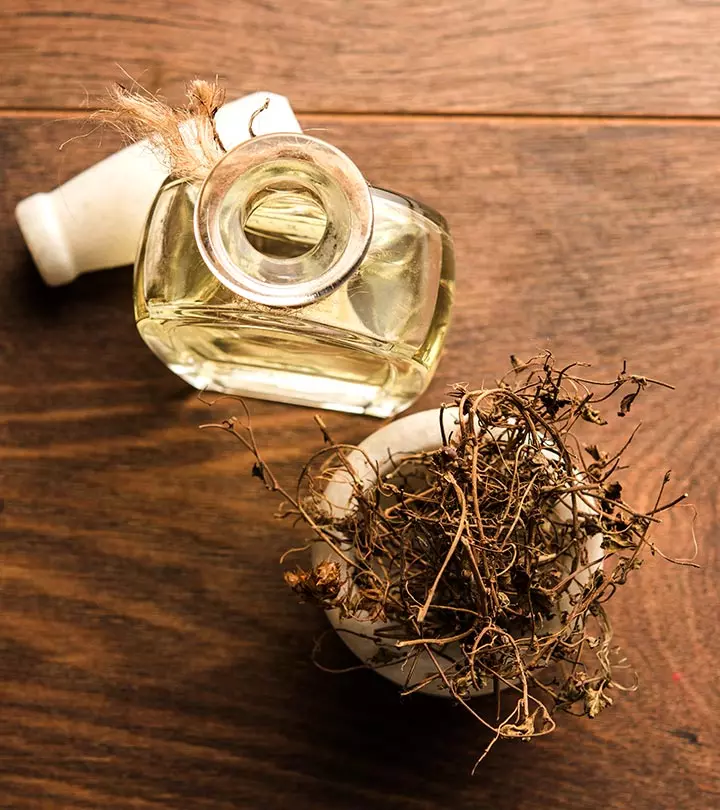

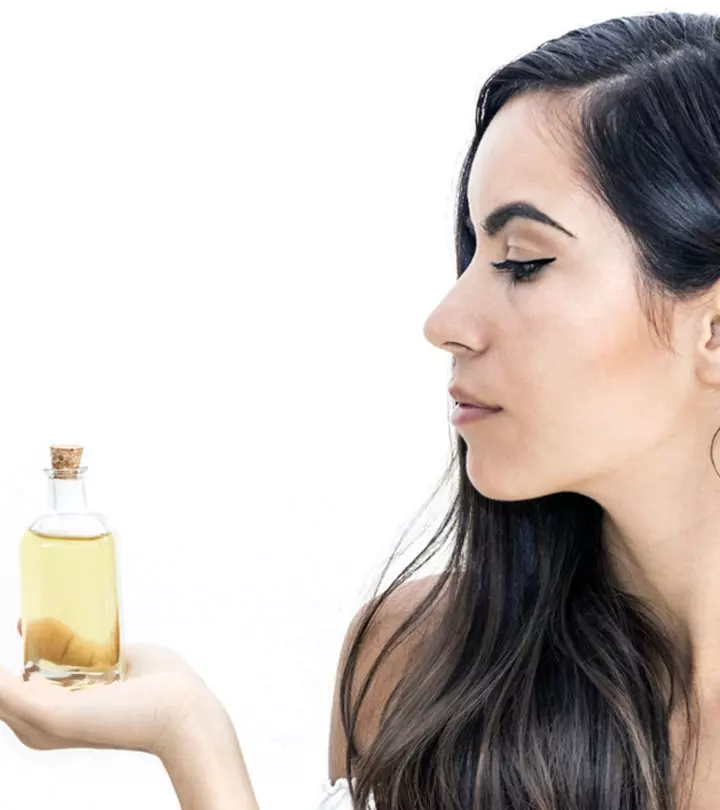
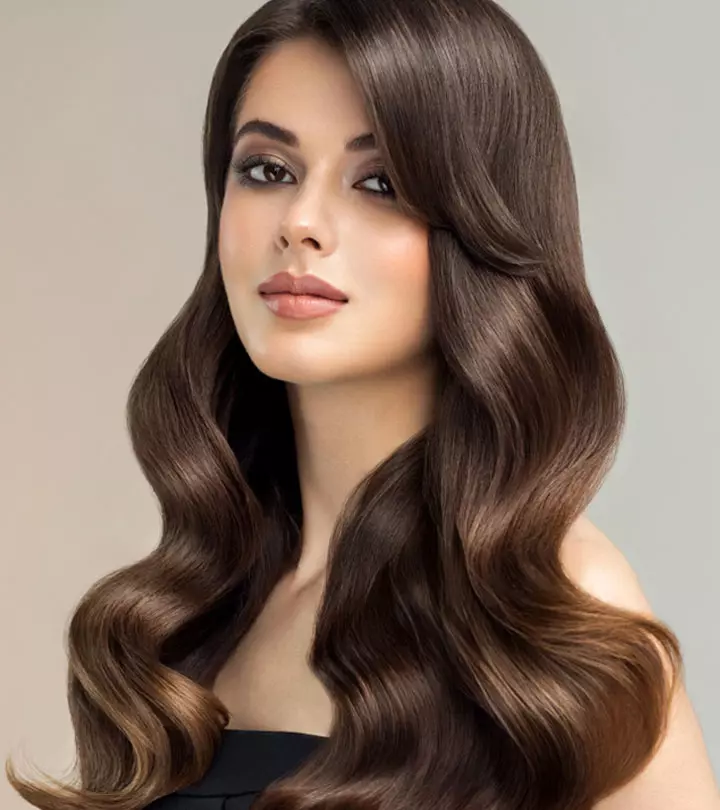


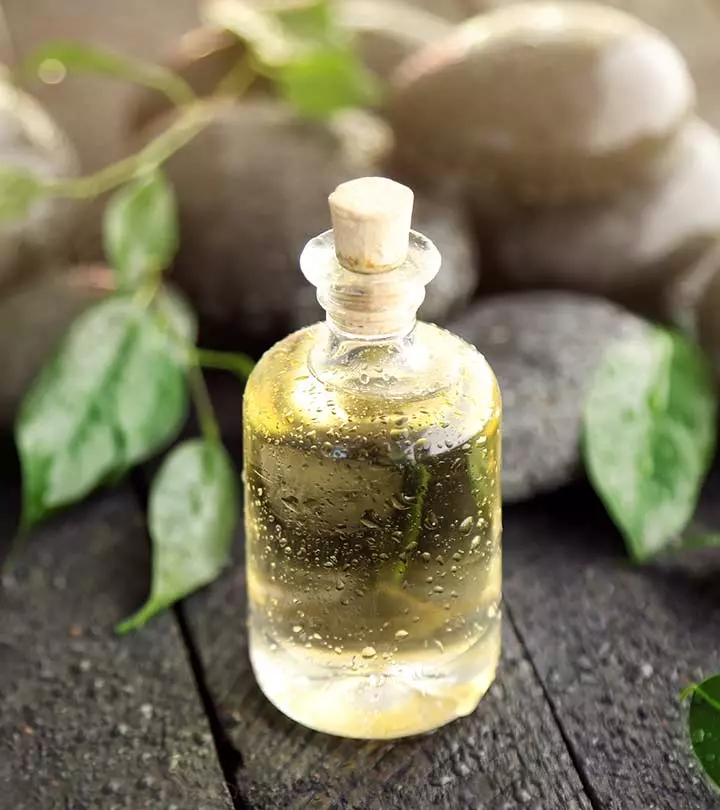
Community Experiences
Join the conversation and become a part of our empowering community! Share your stories, experiences, and insights to connect with other beauty, lifestyle, and health enthusiasts.